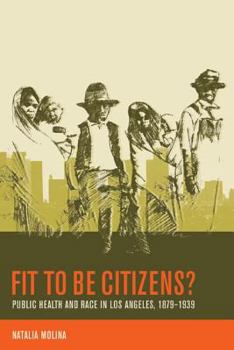Fit to Be Citizens?: Public Health and Race in Los Angeles, 1879-1939 Volume 20
(Book #20 in the American Crossroads Series)
Select Format
Select Condition 
Book Overview
Meticulously researched and beautifully written, Fit to Be Citizens? demonstrates how both science and public health shaped the meaning of race in the early twentieth century. Through a careful examination of the experiences of Mexican, Japanese, and Chinese immigrants in Los Angeles, Natalia Molina illustrates the many ways local health officials used complexly constructed concerns about public health to demean, diminish, discipline, and ultimately...
Format:Paperback
Language:English
ISBN:0520246497
ISBN13:9780520246492
Release Date:March 2006
Publisher:University of California Press
Length:293 Pages
Weight:0.94 lbs.
Dimensions:0.8" x 6.1" x 9.0"
Customer Reviews
1 rating
Compelling History of Race, Citizenship, and Public Health
Published by Thriftbooks.com User , 15 years ago
Framing Natalia Molina's Fit to be Citizens? are provocative questions probing the racialization of Mexican, Chinese, and Japanese residents of late 19th and early 20th century Los Angeles. From the outset, Molina identifies the "fluidity of racial understandings and the many ways in which racial categories evolved" (6) to establish a "regional racial lexicon" (13). This lexicon institutionalized these three immigrant groups as carriers of disease and a menace to the mythical "healthy-Eden" (12) which Los Angeles supposedly offered prospective white settlers. Molina skillfully outlines how the `disease vector' label fluctuated between these three groups based on specific historical circumstances from 1879-1939. For example, while Mexicans were largely ignored by L.A. County Health officials before the 1910s, with Chinese immigrants bearing the brunt of discriminate public health policies in this period, Mexican communities increasingly came under the purview of public health officials in the 1920s and 1930s. While Molina contends that this study focuses primarily on Mexicans, because they were the largest immigrant group in Los Angeles by 1930, her modesty is unwarranted. Molina does a superb job of comparatively assessing public health officials' ability to shape what municipal, state, and federal leaders, as well as the general public knew about Chinese, Mexican, and Japanese communities in L.A. In addition, her detailed sketch of medical discourses that targeted Chinese launderers and vegetable peddlers, and Japanese and Mexican women and laborers, highlights the fluidity of racialization and the changing positions of marginalized populations on the racial hierarchy at any given time or place. This highly readable, deftly researched interdisciplinary text is a must read for students and scholars of history, ethnicity, race and gender studies, urbanization, public health and immigration. For the lay reader, more importantly, this book is a window into the devastating consequences of racializing marginal groups as dirty and diseased. Historically, the burden of epidemic outbreaks in North America rests unequally on the shoulders of immigrant and minority communities. While Molina's work traces the past grave injustices that the institutionalization of racialized public health policies has placed on minority groups, it also offers some cause to hope. Molina addresses the question of hope in her brief yet insightful epilogue, "the very forms of racialization that have harmed and excluded communities...become focal points for solidarity and collective mobilizations aimed at turning negative ascription and exclusion into positive affirmation and empowerment" (188). Fit to be Citizens? expertly outlines how quickly the privileges of citizenship can come under siege. In light of modern day health scares such as SARS and the Avian Flu, Molina's account serves as a warning to public health professionals, government bodies, and






